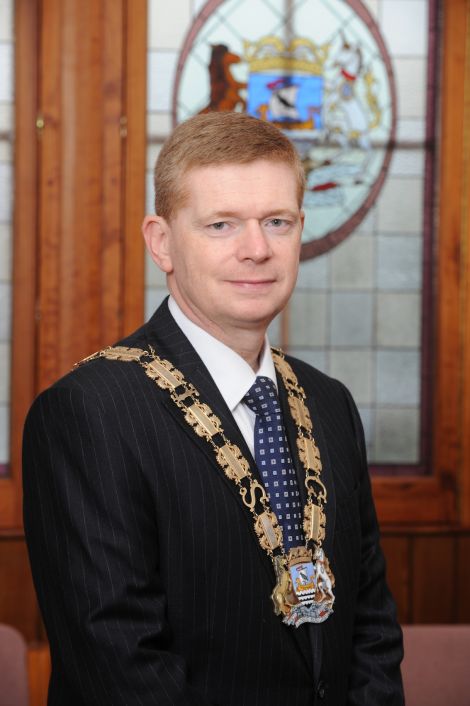News / Convener hoping for unity in new year
SHETLAND Islands Council convener Malcolm Bell has urged the wider community to work with the local authority to overcome the considerable financial challenges it faces in the new year.
In November the council set its first balanced budget since way back in 1997 having slashed annual spending by £35 million.
In an end-of-year interview coming at the midpoint of this council’s term of office, Bell reflected that when elected in 2012 he “really did doubt that we could make that level of savings and maintain the quality of service”.
“There is no doubt that the scale of the task we faced was the hardest of any council in Scotland and probably the UK,” he said.
Bell was at pains to stress the council is not “euphoric” about balancing its books; rather, it is satisfied at eliminating the deficit while mindful of mood music from Westminster and Holyrood indicating finances will remain tight until 2020.
“I don’t think anyone else is going to ride in to save us,” he said. “We’ve got to come together as a community and make the best of the resources that we’ve got. I really do appeal to people to work with us.”
Looking back on 2014, a year dominated politically by the Scottish independence referendum, Bell talked admiringly of Shetland’s many ambassadors in the fields of sport and music.
He particularly singled out Commonwealth Games competitors Erraid Davies (who won a swimming bronze medal), Andrea Strachan and Lynda Flaws; the successful visit of the games’ baton relay in July, and the achievements of Margaret Scollay in marshalling around 100 fiddlers who took part in the Military Tattoo in Edinburgh the following month.
“Those were the highlights of the year for me and demonstrated that Shetland continues to punch well above its weight in the outside world,” Bell said.
Become a member of Shetland News
The local economy has remained buoyant due to the oil and gas industry, though many question whether Shetland is benefiting enough given the social and economic disruption.
Of particular concern is the impact on accommodation, with the cost of buying homes and renting privately beyond the reach of many.
“There is no doubt that – whilst oil has over the years provided Shetland with a great many benefits – equally, and particularly at this time of massive growth, it doesn’t come without its challenges,” Bell said.
He said the council and Hjaltland Housing were striving to build more social housing, and he is hopeful inflated rent and house prices represent a “short term bubble” caused by the construction of Total’s huge gas plant.
“It makes it very, very difficult for young people trying to access housing, particularly for the first time,” he said. “This is seen not only in Shetland but all over the country, but it’s particularly acute here and we need to work together with governments to find ways to resolve it.”
He emphasised the importance of maintaining the SIC’s oil reserves’ present value, with the interest they generate enabling it to spend around £10 million a year extra on services – more than it collects annually in council tax.
“The level of grant received by the council from the Scottish Government is likely to reduce by around £30 million over the course of this council. That is unprecedented and we need to work together as a community to ensure we continue on the path we are on of maintaining good services on an ever reducing budget.”
The convener, who in his previous working life was Shetland’s chief police inspector, said that for most of his working life “we got used to budgets increasing in real terms year on year – now we are facing real terms reductions”.
Of course, the most difficult area to make savings has been in education. Last month a programme of school closures was decisively rejected – and, while consultations on the future of Mid Yell and Whalsay are still technically “live”, the widespread expectation now is there will be no closures this side of the 2017 election.
“The schools issue has been very difficult for the whole community and we recognise that. With Shetland’s particular geography, we are going to have to find ways to provide education in small, remote areas and recognise that whole-scale amalgamations are not always the answer.“We have to face the reality that we weren’t able to persuade the communities involved – or a majority of members – that closings schools at this time was the right thing to do,” Bell said.
“But equally the question of educational benefit in some very small schools may need to be addressed, and the cost of providing education needs to be factored in as well. But we very much want to do this working with the communities.”
The issue again raised questions about how a non-political council functions. Had the SIC been led by a partisan group that stood on a platform of shutting schools, last month’s vote may well have brought the administration down.
With no party alignment within the corridors of Lystina House, there was no question of that happening. Bell rejects councillor Jonathan Wills’ insistence that a “cabal” of opposition councillors is dictating SIC policy behind closed doors, instead talking of a loose “coalition of 22”.
“We have 22 independent members, elected by their peers, who come together with the best interests of Shetland at heart,” he said. “We don’t have party discipline, and we have to work together and build consensus on a case-by-case basis.
“Clearly we have arguments, we have discussion – it wouldn’t be healthy if there were no votes, or every vote was 22-0, but that’s not going to happen. We are a coalition; we can disagree without being disagreeable with each other.”
The schools vote prompted Wills and councillor Allison Duncan to take their concerns that the council remains in a precarious financial position to the Accounts Commission’s offices in Edinburgh.
However Bell appeared unfazed by that: “I wouldn’t expect the Accounts Commission to be concerned – they’ve been effusive in their praise of the way this council has been run in the last few years.”
A fortnight ago Aberdeen City Council’s finance chief Steve Whyte was appointed to a dual role with the SIC, replacing the much-heralded James Gray.
 The decision raised a few eyebrows, with some claiming it could lead to a dilution of the council’s control over its own affairs, but Bell is confident it will be a mutually beneficial arrangement.
The decision raised a few eyebrows, with some claiming it could lead to a dilution of the council’s control over its own affairs, but Bell is confident it will be a mutually beneficial arrangement.
“In many ways we’re going to have to see how this goes,” he said. “It’s new, it’s quite innovative, but more and more public agencies are going to have to look for ways that they can share services – quite simply because of public finances.”
Bell added there was “no way” the amalgamation of councils would be countenanced: “That would be politically unacceptable and unacceptable for very good reasons – but that doesn’t mean we can’t collaborate with other authorities in order to make best use of resources.”
The Our Islands Our Future (OIOF) campaign sought to take advantage of the state of constitutional flux brought on by the independence referendum – irrespective of the outcome.
Bell said Scotland was “one of the most centralised countries in Europe and that needs to change – Edinburgh is no less remote to Shetland than London”. He added: “From a Shetland perspective the proof in the Smith Commission [on more powers for Scotland] pudding will be in how much power is devolved from Holyrood.”
Become a member of Shetland News
Shetland News is asking its readers to consider paying for membership to get additional perks:
- Removal of third-party ads;
- Bookmark posts to read later;
- Exclusive curated weekly newsletter;
- Hide membership messages;
- Comments open for discussion.
If you appreciate what we do and feel strongly about impartial local journalism, then please become a member of Shetland News by either making a single payment, or setting up a monthly, quarterly or yearly subscription.
































































